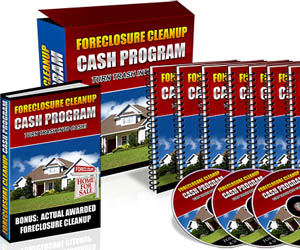How to Start Your Own Foreclosure Cleanup Company
A new article on June 3, 2009 from MSN Money writer Michael Brush indicates that there is a third wave of foreclosures still to come from prime borrowers (i.e. those previously “safe-borrowers” with sound credit and fixed-rate mortgages) as a result of job losses thanks to the worsening economy (“Coming: A 3rd Wave of Foreclosures”).
The article states that “In the first quarter, the percentage of these borrowers who were behind on their mortgages or in foreclosure had doubled from a year earlier, to nearly 6%” and goes on to say that “Credit Suisseanalyst Rod Dubitsky predicted last week that 8.1 million mortgages, or 16% of all mortgages, will go into foreclosure over the next four years. A weak economy, continued declines in home prices and rising delinquencies among prime borrowers all but ensure that foreclosures “will march steadily higher,” he says.” Not such great news for the economy, but good news indeed for entrepreneurs interested in starting a foreclosure cleanup business to clean and repair foreclosed homes for the banks.
To put this in perspective, this means that there will be over 2 million foreclosures a year and more than $2,025,000,000 up for grabs in money that will be spent on cleaning up these foreclosed properties (since the average bill is $1000+ to clean up one of these properties).
Let’s take a look at thow you can capitalize on the foreclosure cleanup / property presrevation industry by starting your own trashout company:
Set Up Your Company Properly
If you want to be hired for cleanup or preservation work, you’ll need to operate your business as a professional company. The good news is that you can set up a business quickly and inexpensively, and usually on your own. Many people decide to set up an LLC (Limited Liability Company) because of how quickly and easily it can be done but you’ll want to check with your accountant or other business professional to select the type of business entity that’s right for your personal situation.
If you do decide to start an LLC, you can usually find all of the documents you need online from your state’s government website. Usually the branch you’re looking for will be called the “Industrial Commission” or “Corporation Commission” or similar. Try typing in “start a business + ______ (your state)”. Anything ending in “.gov” is usually a good place to start as it indicates a government site.
Once your business is set up, you’ll need an Employer Identification Number (EIN), which is like a SSN for your business. You can register for one online: type in “IRS” & “EIN” into a search engine to find the online registration link.
As soon as you have your EIN (which you can usually get immediately online), you can open up a business bank account for your company. This step is very, very important. In the excitement of things, many people get caught up in the day-to-day dealings of running a business and use their personal accounts to pay for business expenses. Not only does this present an accounting nightmare at the end of the year, but it could present problems for you with the IRS if you don’t keep your personal and business finances separate.
Once you legally set up your business, you may be required to register your business with your county or city in order to get a business license to operate. You can start by calling City Hall or the Office of the County Clerk to inquire as to whether or not you need a city/county/state business license and if so, how to get one.
So to recap:
1. Legally set up your business
2. Get your EIN # and set up a business bank account
3. Apply for a business license
4. If you want to do preservation work, determine whether or not you need a contractors’ license



